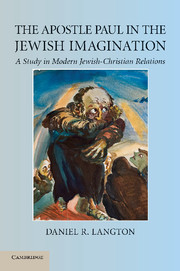Book contents
- Frontmatter
- Contents
- Acknowledgments
- Introduction
- PART I THE APOSTLE PAUL AND POPULAR JEWISH CULTURAL IDENTITY
- PART II THE APOSTLE PAUL AND JEWISH RELIGIOUS IDENTITY: NEW TESTAMENT STUDIES AND THEOLOGICAL APPROACHES
- PART III THE APOSTLE PAUL AND JEWISH INTEREST IN THE JUDEO-CHRISTIAN TRADITION: ARTISTIC AND LITERARY APPROACHES
- PART IV THE APOSTLE PAUL AND JEWISH CRITIQUES OF THE PLACE OF RELIGION IN SOCIETY: PHILOSOPHICAL AND PSYCHOANALYTICAL APPROACHES
- Conclusion
- Appendix: The Story of Abbu Gulish in The Book of Tales
- Bibliography
- Scripture and Other Ancient Writings Index
- General Index
- References
PART IV - THE APOSTLE PAUL AND JEWISH CRITIQUES OF THE PLACE OF RELIGION IN SOCIETY: PHILOSOPHICAL AND PSYCHOANALYTICAL APPROACHES
Published online by Cambridge University Press: 07 May 2010
- Frontmatter
- Contents
- Acknowledgments
- Introduction
- PART I THE APOSTLE PAUL AND POPULAR JEWISH CULTURAL IDENTITY
- PART II THE APOSTLE PAUL AND JEWISH RELIGIOUS IDENTITY: NEW TESTAMENT STUDIES AND THEOLOGICAL APPROACHES
- PART III THE APOSTLE PAUL AND JEWISH INTEREST IN THE JUDEO-CHRISTIAN TRADITION: ARTISTIC AND LITERARY APPROACHES
- PART IV THE APOSTLE PAUL AND JEWISH CRITIQUES OF THE PLACE OF RELIGION IN SOCIETY: PHILOSOPHICAL AND PSYCHOANALYTICAL APPROACHES
- Conclusion
- Appendix: The Story of Abbu Gulish in The Book of Tales
- Bibliography
- Scripture and Other Ancient Writings Index
- General Index
- References
Summary
After the Enlightenment and the attendant phenomena of the dissolution of the ghetto and the widespread establishment of legal emancipation, there was no longer one norm of Jewish existence (if there ever had been). The first wave of Jews who did not abandon Judaism for another faith but who nevertheless found themselves living outside the Jewish community represented a new phenomenon. In earlier times, the existence of a Jew who was at odds with his community, who held ideas that were deemed by the religious authorities as heretical, and who was attracted to non-Jewish ways of thinking was untenable. And yet, over time, as a result of a tremendous variety of pressures and influences that accompanied modernity, the ‘secular Jew’ emerged to become a permanent feature of the Jewish landscape. From that time to this, a good deal of discussion has taken place as to whether such individuals can meaningfully be described as Jewish. One seminal contribution was a collection of essays entitled The Non-Jewish Jew (1968) in which the Polish-Jewish journalist Isaac Deutscher made an impassioned defence of this new species of Jew. Insistent that ‘the Jewish heretic who transcends Jewry’ was part of a Jewish tradition whose revered membership had begun with Spinoza, he went on to describe some of their characteristics.
- Type
- Chapter
- Information
- The Apostle Paul in the Jewish ImaginationA Study in Modern Jewish-Christian Relations, pp. 231 - 233Publisher: Cambridge University PressPrint publication year: 2010



